
Recently on Cyclingnews.com |
91st Tour de France - July 3-25, 2004
An interview with Roberto Heras, June 26, 2004
Liberty, Egalité, Fraternité
One of a handful of contenders that can seriously challenge Lance Armstrong at the upcoming Tour de France, Roberto Heras is back with the 'brotherhood' at Liberty Seguros, and has quietly been preparing himself in his attempt to win the Grand Boucle. Can he do it? Cyclingnews' Martin Hardie investigates.
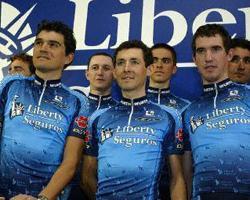
|
Cyclingnews: When you won the Vuelta in 2000 you were a leader of a team in your own right. Why did you change from being a leader and a winner to being a domestique for someone else?
Roberto Heras: Well it was because of the point I was in my career. In the end, after various offers, I decided that it was time to leave Kelme. I had five very good years with Kelme and I thought, 'Well, my contract with Kelme was at an end,'; after winning the Vuelta in 2000, things and opportunities were different and I needed a change. USPS had a good looking project and that was that, nothing more. I could of stayed with Kelme but I felt like a change.
CN: When you joined USPS did you think at times that you might become the leader after Lance retired?
RH: No, I never thought that. When I joined USPS nobody was thinking about when Lance might retire. So I never thought about being leader because the leader was Lance.
CN: But for the Vuelta a España?
RH: Yes, for the Vuelta, yes of course I was the leader. That was clear; I had won the Vuelta and I would be the leader for the Vuelta. But nothing more than that.
CN: At times did you ever think that USPS didn't give you enough support in the Vuelta?
RH: No, not really. The situation was pretty clear. You have to remember that for USPS the main objective always is that Lance Armstrong wins the Tour. The Vuelta was an objective but not the grand objective of the team. Thus many times many riders would come to the Vuelta after putting in big efforts at the Tour, having done a lot of very good, hard work and so it wasn't a question of support, it was just the fact that people were just very, very tired. It was normal that people couldn't respond 100 percent in the Vuelta because they had done so much good work in the Tour.
CN: The other thing I suppose about the Vuelta is that people are also looking forward to the World Championships, for example last year George Hincapie quit the Vuelta during the last week to get ready for the World's in Hamilton.
RH: Yes, that is the other thing that comes into play at that time of year.
CN: Regarding what you have learnt during your years with USPS, do you think these experiences will help you in the Tour?
RH: Well I learnt things, overall and most importantly how to prepare for the Tour. And for example how to work in the Tour. So yes, during my Postal years, I believe I learnt a lot of things, not only for the Tour but also for my career in general.
CN: Is the fact that both Lance and Johan Bruyneel know a lot about your capabilities, your capacities and your limits a problem for you in challenging USPS in this year's Tour?
RH: Well I don't think this is a problem, I can just give 100 percent, it's not an inconvenience for me nor is it a problem.
The Tour or the Vuelta?
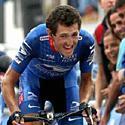
|
CN: So for USPS the Tour was THE focus each year, but for you personally, are the Vuelta and the Tour of equal importance? Or is one more important than the other?
RH: Mate, well first of all it is the Tour and then the Vuelta. That is, it is simply a question of the dates, the Tour comes first in the calendar, it is this way because of the timing of the two races. This year the Tour is very important for me and for the team. But because of the way the races are arranged on the calendar, I simply look at it this way: I will ride the Tour and then I will ride the Vuelta.
CN: But can we say that the Tour is more important?
RH: No, it is not more important, but the Tour is the Tour.
CN: Are you interested in the Olympics?
RH: No, not at all.
Liberty secure with Saiz
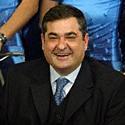
|
CN: OK, now, why Liberty Seguros? And maybe more importantly or to put the question another way: why Manolo Saiz?
RH: Well, it's very simple. Firstly, because I like Manolo Saiz as a director very much, the way he works, how he has always worked. Secondly, because it is a Spanish team with Spanish people, riders, compañeros, whom I always like to ride with a lot. And thirdly, well, it gives me the opportunity to be a leader of a team in the Tour de France - something that I have always wanted to do.
CN: Some people at times might think that, well it seems that maybe it is not possible for Manolo Saiz to direct a team that can or will win the Tour. He sometimes is seen as the perpetual bridesmaid. A director who plans things to great detail but never quite achieves the great prize. At other times, it seems that what appears to be important to Manolo is publicity - the number of days in yellow, for example, rather than the final result. I remember when ONCE fought to defend Igor Gonzalez de Galdeano's yellow jersey a few years back. Some thought that this weakened the team when they were needed later in the Tour to really help Beloki. So I suppose my question is, do you think a team led by Manolo Saiz can win the Tour?
RH: Yes, certainly - of course a team led by Manolo can win the Tour! Manolo Saiz hasn't won a Tour to date - although he has got to the podium with Zulle and Beloki - but I believe perfectly the he hasn't won a Tour not because he was simply looking for publicity or days in the leader's jersey but because they were up against people who were better or faster than them, like Indurain and Armstrong.
CN: So is this the, or has this been the problem of Manolo Saiz - Armstrong and Indurain?
RH: Well, it is not a problem of Manolo or Manolo's problem as such. It is the same problem for, say, Ullrich or Rudy Pevenage... let's be clear: Manolo has the capacity to direct a team that can win the Tour de France.
CN: OK, what then has Manolo done for you since you have joined him?
RH: First he has changed my position on the bike and second he has changed the way I work, my training ... now I train more and I train better.
CN: Can you give us a little detail of what you mean?
RH: No, no, no. The volume of training is greater and after that I changed my position on the bike - that is all I will say.
CN: Will this help you in your time trialling?
RH: Manolo is someone who really understands the time trial - the change in my bike position has and will help me in this discipline. I think he is someone who can really help me better my time against the clock.
CN: It seems that these slight changes in position for people like yourself, and for example Iban Mayo, are very important, small changes in position and design and positioning seem to bring big results. Before we would not have thought of you or Iban as being able to really time trial but now things seem to be changing, at least to a point where you can hold your own against the clock.
RH: Yes I think that is right, these changes seem to make a difference for us.
The Tour contenders
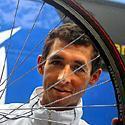
|
CN: Who do you rate as the contenders for this year's Tour?
RH: The number one favourite is Lance, of course. He is on top of the list above everyone else. After him comes Ullrich. Then, well, Mayo. Maybe Simoni.
CN: Do you really think it is possible for Mayo this year? And for yourself?
RH: Mayo? To win the Tour? Why not? He is one the favourites, one of the possible winners. I am also amongst those that weigh into the mix, within the group that comes after Lance. After Lance, well, there comes the rest of us.
CN: Up until now, all of you have been a little hidden from view - save for Mayo and Hamilton...
RH: Hamilton of course is within this group of riders in contention...
CN: But the rest of you have done very little; up until June we haven't seen much of Lance, Ullrich or yourself - is this part of you plan?
RH: Yes, it is part of the plan, the preparation for the Tour, a part of the physical preparation. We all want to get to the Tour and be able to give 100 percent and when the Tour starts I think all of us will be at 100 percent ... so it's part of my plan.
CN: So your results prior to the Euskal [Bizikleta] - in May for example, in Alconbendas, Navacerrada, Asturias, they don't mean anything? We can't read anything into these results?
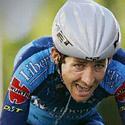
|
Other stuff
|
RH: No, you can't read anything into these results... my first - and only - test prior to the Tour is the Euskal Bizikleta - this is my first great test of the season. We will try and win, but at the very least we will see how our legs are going... I am not going to the Volta a Catalunya, but I will race the Spanish Championships in Cantabria. Other than that, I will simply be training for the Tour. [Editor's note: This interview was conducted before the start of the Euskal Bizikleta, which Heras won from Euskaltel-Euskadi's Roberto Laiseka and Samuel Sanchez.]
CN: OK, is it possible to beat Lance?
RH: After the Tour I will tell you!
CN: Yeah, it is a stupid question, but one I had to ask!
RH: No I can't answer that, no, no, no - after the Tour I will tell you, now I simply do not know.
CN: The Tour route this year is a little different isn't it? There are less mountains in one way, but there are also less flat stages, and then there is the time trial up L'Alpe d'Huez and the changes in rules to the team time trial whereby a team can only lose up to two minutes and thirty seconds. What effect do you think this will have?
RH: I think that the differences between the contenders will be much less than it has been in recent years: We should see a Tour that is much more open.
Que Sera Sera...
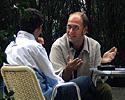
|
CN: You seem to be a fairly relaxed, calm, tranquil type of guy. Que sera sera, whatever will be, will be, a little Doris Day...
RH: [Laughing] Yes...?
CN: What I mean is that it seems that for you, things will sort them out in the moment, at the time of their happening. You can have and make the best laid plans... but for Roberto Heras what seems to be important is the living moment, living the moment as it happens, at the time...
RH: Yes, that is how I see things, both on the bike and off the bike; in all of my life I look at things that way, this is my philosophy of life - in all things. You must take things as they come and you find them at the time.
